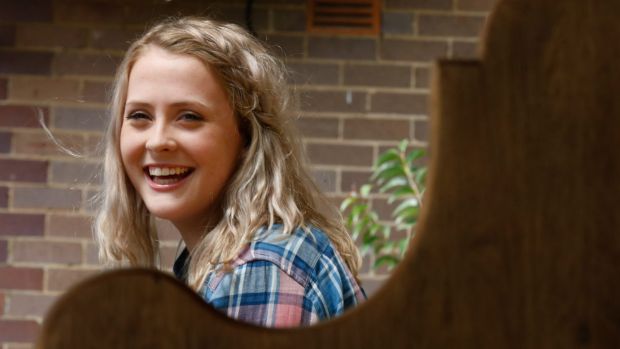
“It made me feel very alone”: 18-year-old singer Lucy Neville is one of many Australians to have suffered from anxiety. Photo: Peter Rae
An alarming number of people think anxiety is a personality trait, rather than a treatable mental health illness that is more common in Australia than depression.
Mental health charity beyondblue has relaunched its national anxiety campaign after its analysis showed 40 per cent of people thought anxiety was “just stress”.
A survey of 700 people aged between 25 and 45 found that only half of those knew that anxiety was not part of someone’s personality, and about the same number thought it affected only a small proportion of people.
About a quarter of Australians would experience an anxiety condition at some point in their lives and and about three million people had a condition now, the Australian Bureau of Statistics said.
“Feeling anxious or stressed about something is part of our daily lexicon, but in fact when we’re talking about anxiety it is very disabling,” beyondblue head Georgie Harman said.
Many people don’t recognise the symptoms of anxiety, which can include hot and cold flushes, a racing heart, snowballing and negative thoughts and compulsive behaviour.
When Lucy Neville started to experience social anxiety in her early teenage years, a family member observed the symptoms and suggested she seek professional help.
“I started to feel very uncomfortable in social situations,” she said. “I felt as if people were judging me and talking about me. It made me feel very alone. I felt that people didn’t understand the way I was feeling and I had no one to talk to.”
With the aid of a psychologist, the 18-year-old singer from Epping has adopted a number of strategies to help manage her anxiety.
“I’ve learned to recognise the difference between reality and what we call ‘movie moments’,” she said. “That’s helped me to understand ways of not catastrophising normal situations.”
A former performer with the Australian Girls Choir, Ms Neville said she was healthy and active now, and would release her first EP this year.
Women are more likely to get anxiety than men – one in three will experience it in their lifetime, compared with one in five men.
Anxiety could rob people of their peace of mind and stop them leaving their homes or holding a job, Ms Harman said.
“No one should have to live with the relentless worrying, panic attacks or compulsive rituals that often characterise anxiety.”
beyondblue: 1300 224 636
Anxiety Disorders
Generalised anxiety disorder: A person feels anxious most days, for six months or more.
Social phobia: A person has an intense fear of being criticised or embarrassed in everyday situations.
Specific phobia: A person is very fearful of a particular object or situation.
Obsessive compulsive disorder: A person has unwanted thoughts that cause anxiety and might try to relieve this with certain behaviour, such as washing hands.
Post-traumatic stress disorder: When a person has upsetting flashbacks from a traumatic event and symptoms last for more than a month.
Panic disorder: A person has recurrent panic attacks or persistently fears having these for more than a month.
Source: beyondblue.
